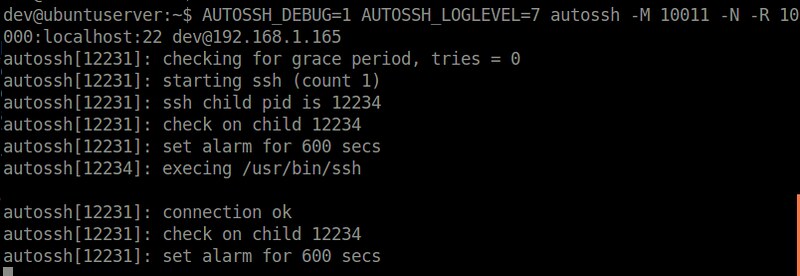mirror of
https://github.com/LCTT/TranslateProject.git
synced 2025-01-16 22:42:21 +08:00
79 lines
3.1 KiB
Markdown
79 lines
3.1 KiB
Markdown
Vic020
|
|
|
|
Linux FAQs with Answers--How to install autossh on Linux
|
|
================================================================================
|
|
> **Question**: I would like to install autossh on [insert your Linux distro]. How can I do that?
|
|
|
|
[autossh][1] is an open-source tool that allows you to monitor an SSH session and restart it automatically should it gets disconnected or stops forwarding traffic. autossh assumes that [passwordless SSH login][2] for a destination host is already setup, so that it can restart a broken SSH session without user's involvement.
|
|
|
|
autossh comes in handy when you want to set up [reverse SSH tunnels][3] or [mount remote folders over SSH][4]. Essentially in any situation where persistent SSH sessions are required, autossh can be useful.
|
|
|
|

|
|
|
|
Here is how to install autossh on various Linux distributions.
|
|
|
|
### Install Autossh on Debian or Ubuntu ###
|
|
|
|
autossh is available in base repositories of Debian based systems, so installation is easy.
|
|
|
|
$ sudo apt-get install autossh
|
|
|
|
### Install Autossh on Fedora ###
|
|
|
|
Fedora repositories also carry autossh package. So simply use yum command.
|
|
|
|
$ sudo yum install autossh
|
|
|
|
### Install Autossh on CentOS or RHEL ###
|
|
|
|
For CentOS/RHEL 6 or earlier, enable [Repoforge repository][5] first, and then use yum command.
|
|
|
|
$ sudo yum install autossh
|
|
|
|
For CentOS/RHEL 7, autossh is no longer available in Repoforge repository. You will need to build it from the source (explained below).
|
|
|
|
### Install Autossh on Arch Linux ###
|
|
|
|
$ sudo pacman -S autossh
|
|
|
|
### Compile Autossh from the Source on Debian or Ubuntu ###
|
|
|
|
If you would like to try the latest version of autossh, you can build it from the source as follows.
|
|
|
|
$ sudo apt-get install gcc make
|
|
$ wget http://www.harding.motd.ca/autossh/autossh-1.4e.tgz
|
|
$ tar -xf autossh-1.4e.tgz
|
|
$ cd autossh-1.4e
|
|
$ ./configure
|
|
$ make
|
|
$ sudo make install
|
|
|
|
### Compile Autossh from the Source on CentOS, Fedora or RHEL ###
|
|
|
|
On CentOS/RHEL 7, autossh is not available as a pre-built package. So you'll need to compile it from the source as follows.
|
|
|
|
$ sudo yum install wget gcc make
|
|
$ wget http://www.harding.motd.ca/autossh/autossh-1.4e.tgz
|
|
$ tar -xf autossh-1.4e.tgz
|
|
$ cd autossh-1.4e
|
|
$ ./configure
|
|
$ make
|
|
$ sudo make install
|
|
|
|
--------------------------------------------------------------------------------
|
|
|
|
via: http://ask.xmodulo.com/install-autossh-linux.html
|
|
|
|
作者:[Dan Nanni][a]
|
|
译者:[译者ID](https://github.com/译者ID)
|
|
校对:[校对者ID](https://github.com/校对者ID)
|
|
|
|
本文由 [LCTT](https://github.com/LCTT/TranslateProject) 原创翻译,[Linux中国](https://linux.cn/) 荣誉推出
|
|
|
|
[a]:http://ask.xmodulo.com/author/nanni
|
|
[1]:http://www.harding.motd.ca/autossh/
|
|
[2]:http://xmodulo.com/how-to-enable-ssh-login-without.html
|
|
[3]:http://xmodulo.com/access-linux-server-behind-nat-reverse-ssh-tunnel.html
|
|
[4]:http://xmodulo.com/how-to-mount-remote-directory-over-ssh-on-linux.html
|
|
[5]:http://xmodulo.com/how-to-set-up-rpmforge-repoforge-repository-on-centos.html
|